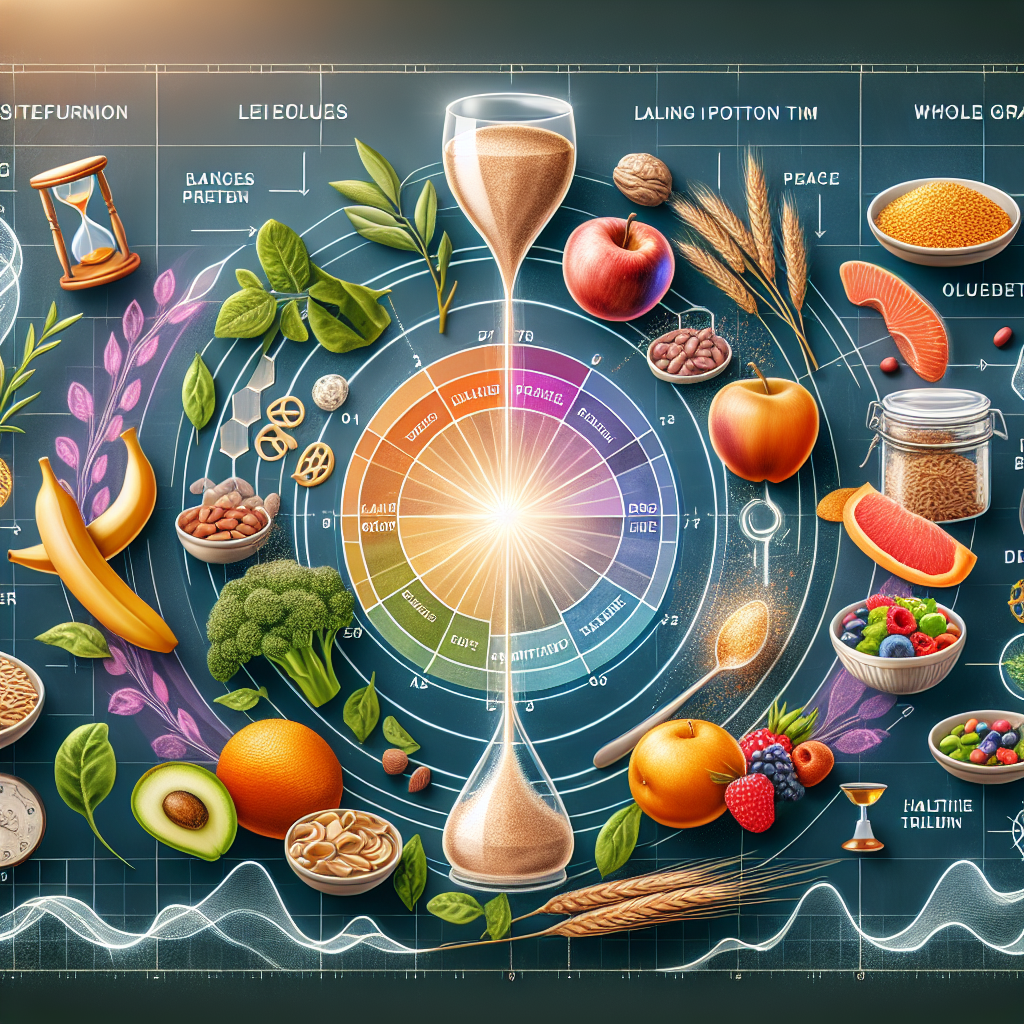The Longevity Diet: What Science Says About Aging Gracefully

Discover the secrets of the Longevity Diet and learn what science says about aging gracefully. Uncover the path to a healthier, longer life. Visit My Vibrant Vitality now.
Exploring the Longevity Diet: Scientific Insights on Aging Gracefully
The quest for the fountain of youth is as old as humanity itself. While we may not have discovered a magical elixir that halts the aging process, scientific research has provided us with valuable insights into how our dietary choices can influence our longevity. This has led to the development of the Longevity Diet, a nutritional approach designed to promote healthy aging and extend lifespan.
The Longevity Diet is based on the principle of caloric restriction without malnutrition. This means consuming fewer calories while still ensuring adequate intake of essential nutrients. Numerous studies have shown that caloric restriction can extend lifespan in a variety of organisms, from yeast to mammals. The underlying mechanism is thought to involve a reduction in metabolic rate and oxidative stress, both of which are associated with aging.
The Longevity Diet also emphasizes the consumption of plant-based foods, particularly fruits, vegetables, whole grains, and legumes. These foods are rich in antioxidants, which help to neutralize harmful free radicals in the body and reduce oxidative stress. Additionally, plant-based foods are high in fiber, which supports gut health and has been linked to a lower risk of chronic diseases such as heart disease and type 2 diabetes.
Another key component of the Longevity Diet is the inclusion of healthy fats, such as those found in olive oil, nuts, and fatty fish. These fats are rich in omega-3 fatty acids, which have been shown to have anti-inflammatory effects and may help to slow the aging process. Conversely, the diet recommends limiting intake of saturated and trans fats, which can promote inflammation and accelerate aging.
The Longevity Diet also advocates for regular physical activity, which has numerous health benefits, including improved cardiovascular health, enhanced cognitive function, and increased lifespan. Exercise is thought to exert its beneficial effects by reducing inflammation, improving insulin sensitivity, and promoting the health of the brain and other vital organs.
While the Longevity Diet provides a general framework for healthy aging, it’s important to note that individual needs may vary. Factors such as age, sex, genetics, and lifestyle can all influence nutritional requirements. Therefore, it’s recommended to consult with a healthcare professional or a registered dietitian before making significant changes to your diet.
In conclusion, the Longevity Diet offers a scientifically-backed approach to nutrition that can help to promote healthy aging and extend lifespan. By focusing on caloric restriction, plant-based foods, healthy fats, and regular physical activity, this diet can help to reduce the risk of chronic diseases and improve overall health. However, individual needs may vary, and it’s important to seek professional advice before making significant dietary changes.
While we may not have found the fountain of youth, the Longevity Diet provides us with a practical and effective strategy for aging gracefully. By making mindful dietary choices and maintaining an active lifestyle, we can influence our longevity and enjoy a higher quality of life in our later years.
The Role of the Longevity Diet in Promoting Healthy Aging: A Scientific Perspective

The Longevity Diet, a dietary approach that emphasizes nutrient-rich, low-calorie foods, has been gaining attention in recent years for its potential to promote healthy aging. This diet, which is based on the eating habits of the world’s longest-lived populations, is believed to slow the aging process, reduce the risk of chronic diseases, and improve overall health. But what does science say about the Longevity Diet and its role in aging gracefully? Let’s delve into the research to find out.
The Longevity Diet is primarily plant-based, with a focus on whole foods like fruits, vegetables, legumes, whole grains, and healthy fats. It also encourages moderate consumption of fish and lean meats, while limiting intake of processed foods, sugars, and unhealthy fats. This dietary pattern aligns with the recommendations of many health organizations, including the World Health Organization and the American Heart Association, which advocate for a diet rich in plant foods and low in processed foods for optimal health.
Scientific research supports the potential benefits of the Longevity Diet for healthy aging. A study published in the Journal of Gerontology found that a diet rich in fruits, vegetables, and whole grains, and low in processed foods and sugars, can slow the aging process and reduce the risk of age-related diseases. This is likely due to the high levels of antioxidants, fiber, and other beneficial compounds found in these foods, which can combat oxidative stress, reduce inflammation, and support overall health.
Another key aspect of the Longevity Diet is calorie restriction, which involves reducing daily calorie intake without sacrificing essential nutrients. Numerous studies have shown that calorie restriction can extend lifespan in a variety of organisms, from yeast to primates. In humans, research suggests that calorie restriction can improve markers of aging, such as blood pressure, cholesterol levels, and insulin sensitivity. However, it’s important to note that calorie restriction should be done under the guidance of a healthcare professional to ensure nutritional needs are met.
The Longevity Diet also emphasizes the importance of regular physical activity, which has been shown to promote healthy aging. Exercise can improve cardiovascular health, boost cognitive function, and enhance overall well-being, making it a crucial component of the Longevity Diet.
In addition to these dietary and lifestyle factors, the Longevity Diet also recognizes the role of genetics in aging. While we can’t change our genetic makeup, research suggests that lifestyle factors can influence how our genes are expressed. This field of study, known as epigenetics, is still in its early stages, but it holds promise for understanding the complex interplay between diet, lifestyle, and aging.
In conclusion, the Longevity Diet, with its emphasis on nutrient-rich, low-calorie foods, regular physical activity, and mindful lifestyle choices, offers a promising approach to healthy aging. While more research is needed to fully understand the mechanisms behind the diet’s potential benefits, current evidence suggests that the Longevity Diet can support overall health and longevity. As always, it’s important to consult with a healthcare professional before making any major dietary or lifestyle changes.
Understanding the Science Behind the Longevity Diet and Graceful Aging
The Longevity Diet, a dietary plan that emphasizes nutrient-rich, low-calorie foods, has been gaining traction in recent years for its potential to promote healthy aging. This diet, which is based on the eating habits of the world’s longest-lived populations, is believed to slow the aging process, reduce the risk of age-related diseases, and extend lifespan. But what does science say about the Longevity Diet and aging gracefully? Let’s delve into the research to understand the mechanisms behind this diet’s purported benefits.
The Longevity Diet is primarily plant-based, with a focus on whole foods like fruits, vegetables, legumes, whole grains, and healthy fats. It also encourages moderate consumption of fish and lean meats, while limiting intake of processed foods, sugars, and unhealthy fats. This dietary pattern aligns with the recommendations of numerous health organizations, which advocate for a balanced diet rich in nutrient-dense foods to support overall health.
The science behind the Longevity Diet’s potential to promote graceful aging lies in its ability to influence several key biological processes. One of these is inflammation, a natural immune response that, when chronic, can contribute to various age-related diseases such as heart disease, cancer, and Alzheimer’s. The Longevity Diet, rich in antioxidants and anti-inflammatory compounds, can help to mitigate this inflammation, thereby reducing disease risk.
Another critical process influenced by the Longevity Diet is cellular aging. Each time a cell divides, the ends of its chromosomes, known as telomeres, shorten. When telomeres become too short, the cell can no longer divide and becomes senescent or dies. This telomere shortening is a natural part of aging, but lifestyle factors, including diet, can influence its rate. Research suggests that a nutrient-rich, low-calorie diet like the Longevity Diet can slow telomere shortening, thereby potentially extending cellular lifespan and slowing the aging process.
The Longevity Diet also promotes a healthy gut microbiome, the community of microorganisms living in our intestines. Emerging research suggests that the gut microbiome plays a crucial role in health and disease, including aging. A diet rich in diverse plant foods, like the Longevity Diet, can support a diverse and balanced gut microbiome, which in turn can promote health and longevity.
Lastly, the Longevity Diet may promote healthy aging through its effects on metabolic health. It is low in added sugars and processed foods, which can contribute to obesity, type 2 diabetes, and other metabolic disorders. By promoting a healthy body weight and metabolic health, the Longevity Diet can reduce the risk of these conditions, which are associated with premature aging and reduced lifespan.
In conclusion, the science suggests that the Longevity Diet may indeed promote graceful aging. By influencing key biological processes like inflammation, cellular aging, gut health, and metabolic health, this diet can potentially extend lifespan and reduce the risk of age-related diseases. However, it’s important to note that diet is just one piece of the puzzle. Regular physical activity, adequate sleep, stress management, and other healthy lifestyle habits are also crucial for aging gracefully. As always, it’s recommended to consult with a healthcare professional before making any significant changes to your diet or lifestyle.